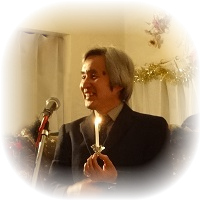↓Audio link to the sermon:(1st worship recording)
(If you can’t listen on your iPhone, please update your iOS)
The book of Jonah shows in a unique way how God’s great love is for all of humankind. God’s love is for each and every one of us. No matter who we are, if we receive the love of God, we are able to repent and live differently. In today’s message I would like to talk about this great love of God, as well as connections between the book of Jonah and the New Testament.
In Jonah chapter 3, the prophet finally obeys God’s call to go to Nineveh and warn people there about the coming judgment. He spent all day telling the city, “Forty more days and Nineveh will be overthrown.” And he urged them to repent. And a great miracle occurred. Verse 5 says, “The Ninevites believed God. A fast was proclaimed, and all of them, from the greatest to the least, put on sackcloth.” It says that they repented, from the lowly commoners to the rulers of Nineveh. Verse 6 says, “When Jonah’s warning reached the king of Nineveh, he rose from his throne, took off his royal robes, covered himself with sackcloth and sat down in the dust.” Then, in verses 8 and 9, the king declared, “But let people and animals be covered with sackcloth. Let everyone call urgently on God. Let them give up their evil ways and their violence. Who knows? God may yet relent and with compassion turn from his fierce anger so that we will not perish.” This repentance is remarkable. What a miracle of God among the people of Nineveh, these Assyrians who were famous for their brutality. Reading this, I am simply amazed. Something like this can only be a miracle, the work of the Holy Spirit. Finally, verse 10 says, “When God saw what they did and how they turned from their evil ways, he relented and did not bring on them the destruction he had threatened.”
Chapter 4, verse 1: “But to Jonah this seemed very wrong, and he became angry.” Reading this I am reminded of the Pharisees and teachers of the Law during Jesus’ time. They thought: I obey the Law, I keep the Sabbath, so therefore God loves me. At the same time they thought: The Gentiles do not know the Law or obey it; therefore, they are destined for God’s judgment. And so it was difficult for them to accept Jesus Christ, who taught about forgiveness and who was loved by the common people. The Pharisees and teachers of the Law thought that strictly obeying the Law was more important than God’s love and forgiveness. They held this belief rigidly. And so they strongly condemned Jesus. So did Paul, before he met Jesus himself. It was difficult for these religious leaders to truly encounter the God of compassion who is slow to anger and abounding in love.
Although Jonah had a similar attitude to the Pharisees, he received a special guidance from God. We read about this in Chapter 4, verse 5 onwards. God provided a plant that grew over Jonah and provided him shade from the sun. And when the plant died, Jonah was upset. God spoke to Jonah about this. And what God said is an important message from the book of Jonah. Here, God reveals his great love. Let’s read 4:10, 11: “But the Lord said, ‘You have been concerned about this plant, though you did not tend it or make it grow. It sprang up overnight and died overnight. And should I not have concern for the great city of Nineveh, in which there are more than a hundred and twenty thousand people who cannot tell their right hand from their left—and also many animals?’” The book of Jonah ends with these words. Whether or not these words changed Jonah’s heart, the book leaves to our imagination.
When we read the Old Testament, it’s important to think about how it is connected to the New Testament. Hebrews 10:1 says, “The law is only a shadow of the good things that are coming—not the realities themselves.” Similarly, Colossians 2:17 says, “These are a shadow of the things that were to come; the reality, however, is found in Christ.” In other words, the Old Testament Law is meant to point towards the future reality of the New Testament. That future centers around Jesus Christ and his death on the Cross. The Old Testament also foreshadows a salvation that is given by grace, not earned by obedience to the Law.
Christ himself is foreshadowed in the book of Jonah. Let’s read about this in Matthew 12:38-41: “Then some of the Pharisees and teachers of the law said to [Jesus], ‘Teacher, we want to see a sign from you.’ He answered, ‘A wicked and adulterous generation asks for a sign! But none will be given it except the sign of the prophet Jonah. For as Jonah was three days and three nights in the belly of a huge fish, so the Son of Man will be three days and three nights in the heart of the earth. The men of Nineveh will stand up at the judgment with this generation and condemn it; for they repented at the preaching of Jonah, and now something greater than Jonah is here.’”
Jesus made a connection between himself and Jonah, who was in the belly of a fish for 3 days and 3 nights; Jesus would spend 3 days and 3 nights in the grave after his death on the cross, until he rises again. Using the image of Jonah, Jesus predicted his own death, burial, and resurrection. Furthermore, Jesus used the book of Jonah as a good example of repentance: that those who receive the love of God would repent and live differently. Besides this reference in the Gospel of Matthew, the Gospel of Luke also mentions Nineveh as a model of repentance, in Luke 11:32 (“The men of Nineveh will stand up at the judgment with this generation and condemn it, for they repented at the preaching of Jonah; and now something greater than Jonah is here.”). The book of Jonah teaches us that it is possible for anyone to repent and turn to God. To repent is to have a right relationship with God. It is to live in right relationship with our Creator. It is to worship and thank God, and to use the gifts God has given us to bring glory back to Him. This is the way to live in a new relationship with God. For he is the God of the whole world and he is your God.
We can only guess as to whether Jonah was finally changed by the love of God. The book simply shows us that God spoke gently to the stubborn heart of Jonah. God gave him another chance when he turned away. I was reminded of Paul, the Pharisee who persecuted Christians but met the resurrected Jesus and his life was changed. Perhaps, like Paul, Jonah also came to the same understanding of the good news of God’s grace.
The northern kingdom of Israel was at last destroyed by Assyria in the year 722 BC, during the time of prophet Jeremiah. At the time, Jeremiah spoke a message of God’s everlasting love for Israel. Jeremiah 31:3-5 says, “The Lord appeared to us in the past, saying: ‘I have loved you with an everlasting love; I have drawn you with unfailing kindness. I will build you up again, and you, Virgin Israel, will be rebuilt. Again you will take up your timbrels and go out to dance with the joyful. Again you will plant vineyards on the hills of Samaria; the farmers will plant them and enjoy their fruit.’” God loved Israel with an everlasting love. I believe that Jonah finally understood that God’s everlasting love was not only for Israel but also for the Gentiles.
To conclude, may we realize that this everlasting love is poured out on each of us; may we each respond to it by living a life of repentance. Let us live in right relationship with God and give thanks to Him each day.
(If you can’t hear from the bar above, click the blue button)
iPhone





 日本語
日本語